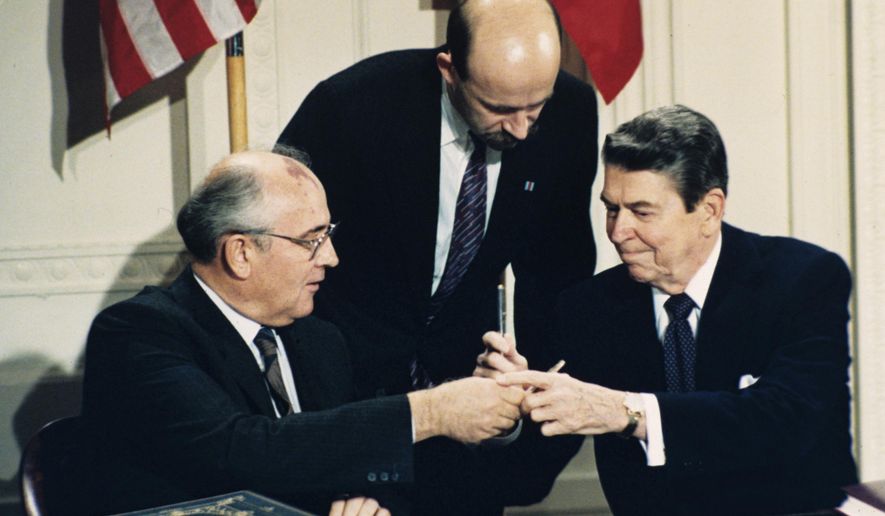On Dec. 25, 1991, the final chapter of the Cold War — which had dominated global politics for a half century — was written by a man who had done more than anyone else to dismantle Soviet Communism.
Mikhail Gorbachev resigned as president of the Soviet Union. The Cold War was finally over, ending not with a dreaded nuclear holocaust but with a peaceful goodbye from a reformer who unintentionally reformed his authoritarian state out of existence.
Mr. Gorbachev’s resignation was lauded by President George H.W. Bush, who credited his Soviet counterpart with ushering in “revolutionary policies” that “transformed the Soviet Union.” Few would disagree, then or now. But Mr. Bush went on to say the last act of the Cold War signified a great American victory, not merely the collapse of a rival super power.
“This is a victory for democracy and freedom. This is a victory of the moral force of our values,” Mr. Bush said in a nationally televised address.
It appeared democracy and free markets had triumphed, were on the march, and would become the foundation of a new and peaceful international order — or at least that was what the U.S. president envisioned. Just months earlier, Mr. Gorbachev had given his blessing to Mr. Bush’s decision to expel Saddam Hussein’s Iraq from Kuwait, a move that would have been unthinkable at the height of the Cold War because Iraq was an old Soviet ally.
But a new world order would not come about. Peace never materialized. Civil wars and genocides would rage in the Balkans, Afghanistan and Rwanda, to name three, as the U.S. and its allies looked on, either unwilling or unable to intervene before the internecine violence spun out of control. Moreover, a fledgling democracy did not survive in the former USSR and the transition to capitalism there proved disastrous.
China, meanwhile, had used force to crush a pro-democracy movement in 1989. Its one-party rule reinforced through state violence, China today believes it will soon possess the world’s largest economy without having liberalized its politics — upending another post-Cold War assumption.
And after the Sept. 11, 2001, terrorist strikes by al Qaeda, the U.S. wielded its unchallenged military might in a war in the Middle East, a war from which the U.S. has not fully extracted itself 18 years on.
In retrospect, the end of the Cold War was not the “end of history,” to borrow Francis Fukuyama’s (or Hegel’s) formulation.
In his 1989 essay, Mr. Fukuyama argued the end of the Cold War and the stunning reforms instituted by Gorbachev meant the world had reached an “end-point of mankind’s ideological evolution and the universalization of Western liberal democracy as the final form of human government.”
Mr. Fukuyama’s thesis has been picked apart a thousand ways. To this day, he is asked to explain what he meant. However the “end of history” may be interpreted, it is clear events have unfolded differently than many expected in 1991 as Mr. Gorbachev quietly exited the world stage.
SEE ALSO: History As It Happens: QAnon and the rise of conspiracy theories in American politics
“Not only had [the U.S.] reached the height of its power but, going back to Fukuyama, we were on the ‘right side of history,’” said Jeffrey Engel, the founding director of the Center for Presidential History at Southern Methodist University, in the latest episode of the History As It Happens podcast.
“We believed the world was going to continue to flow in a democratic fashion, and more importantly, that the United States was the unquestioned champion… It is hard to imagine now, if you can recall, that the United States was extremely popular throughout the world,” said Mr. Engel, the author of “When the World Seemed Knew: George H. W, Bush and the End of the Cold War.”
“We’ve seen over the past 30 years that democracy did not have the hold that we hoped, but also, in part, this is our fault,” Mr. Engel said. “We tried to push democracy faster than it could have naturally evolved,” referring to the post-9/11 interventionism that marked the George W. Bush administration.
If democracy is not in full retreat, authoritarianism “has reemerged” as the greatest threat to the liberal democratic world order, in the view of some observers. As Robert Kagan put it, the strongmen struck back. Look no further than Russia, where a former KBG intelligence officer has held power for 20 years. Or Communist China, where President Xi Jinping may rule for life.
For more of Mr. Engel’s thoughts on the post-Cold War world, and whether U.S. power is in decline, listen to this episode of History As It Happens.




